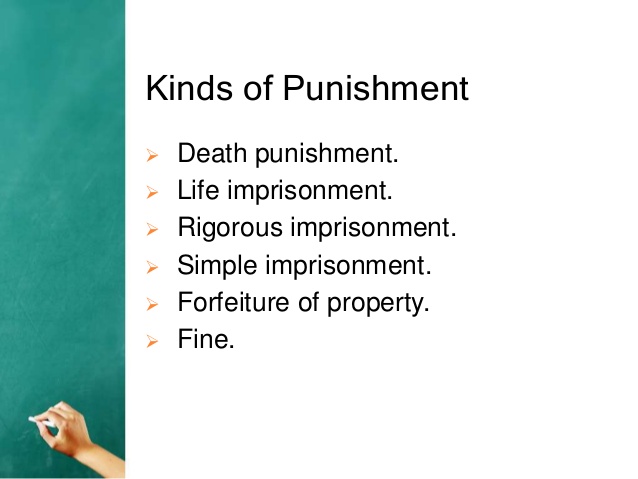According to Section 53 of the Indian Penal Code, the PUNISHMENT UNDER IPC which can be given to the offenders under this Code are-
- Firstly- Death
- Secondly- Imprisonment for life
- Thirdly- Repealed*(omitted by act 17 of 1949)
- Fourthly- Imprisonment which is of two types, 1)Rigorous, that is, with hard labor and 2)Simple
- Fifthly- Forfeiture of property
- Sixthly- Fine
KINDS OF PUNISHMENT UNDER IPC
1. DEATH SENTENCE
Death Sentence is defined as the execution of the offender for the offence committed by him. It is also referred as Capital Punishment.It is the highest degree of punishment that can be awarded. As per the Amnesty International survey, the report of July 2018 , 56 countries accept capital punishment and 106 countries have completely ended capital punishment for all crimes.
Death Sentence is awarded in India only in some exceptional cases such as
1)Waging or attemting to wage war (Sec 121)
2)Abetment of mutiny actually committed(Sec 132)
3)Giving, fabricating false evidence upon which an innocent person suffers death(Sec 194)
4)Murder(Sec 302)
5) Punishment for murder by life convict(Sec 303)
6)Abetment of suicide of a child(Sec 305)
7)Attempt to murder by a person under sentence of imprisonment for life,if hurt is caused(Sec 307)
8)Punishment for causing death or resulting in persistent vegetative state of victim(Sec 376A)
9)Punishment for repeat offenders(Sec 376F)
10)Dacoity accompanied with murder(Sec 396)
2. IMPRISONMENT FOR LIFE
Imprisonment is defined as a constraint on offender’s liability. In ordinary belief imprisonment for life means for whole life but it is not so in India. In India imprisonment for life means for a term of 14years. However the offender is not automatically released on completion of his sentence unless the government passes an order ending his sentence.
4. Imprisonment
(A). RIGOROUS IMPRISONMENT
Rigorous Impisonment means imprisonment with hard labour.In Rigorous imprisonment the offender does works such as grinding corn ,digging earth,drawing water ,cutting fire-wood etc.
Although under Sec 60 of Ipc in every case in which an offender is punishable with imprisonment which may be of either description, it shall be competent to the Court which sentences such offender to direct in the sentence that such imprisonment shall be wholly rigorous, or that such imprisonment shall be wholly simple, or that any part of such imprisonment shall be rigorous and the rest simple.
(B). SIMPLE IMPRISONMENT
In Simple imprisonment offender is confined to jail but he is relieved from any kind of work.Simple Imprisonment is awarded for small offences like wrongful restrint defamation etc.
The lowest duration of imprisonment that is awarded is twenty four hours under Section 510 of Indian Penal Code but the minimum is unlimited and the maximum imprisonment that can be awarded is fourteen years.
5. FORFEITURE OF PROPERTY
Forfeiture of property means taking away the property of the criminal by the state as punishment. The punishment of absolute forfeiture of property of all property of the offenders is now abolished. Section 61 and 62 of the Indian Penal Code dealing with such forfeiture are repealed by Act XVI of 1921.
6. FINE
Fine is derived from the Latin word ‘finis’ and is so-called because its payment puts an end to the offence for which it is imposed. Fine is a sum ordered by the Court in the exercise of criminal jurisdiction to pay as a punishment for an offence. Fine may be sole punishment or alternative or it may be in addition to the imprisonment.
According to Section 63 of the Indian Penal Code , where no sum is expressed to which a fine may extend,the amount of fine to which the offender is liable is unlimited, but shall not be excessive.
FAQs Regarding PUNISHMENT UNDER IPC
What are the Different types of criminal punishment in India Under IPC?
1. Death
2. Life imprisonment
3. Simple or rigorous imprisonment
4. Forfeiture of property
5. Fine





